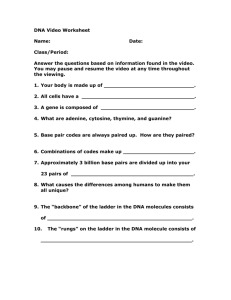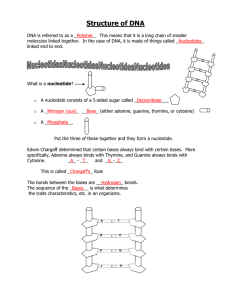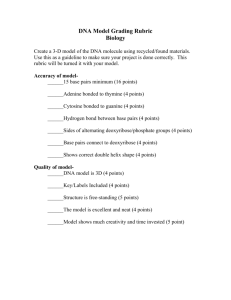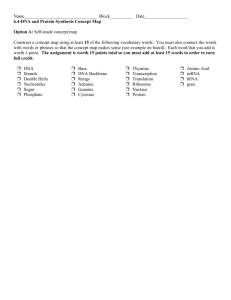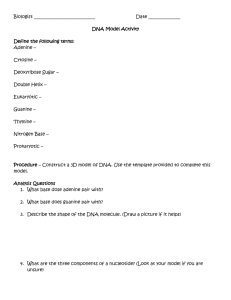DNA Model
advertisement
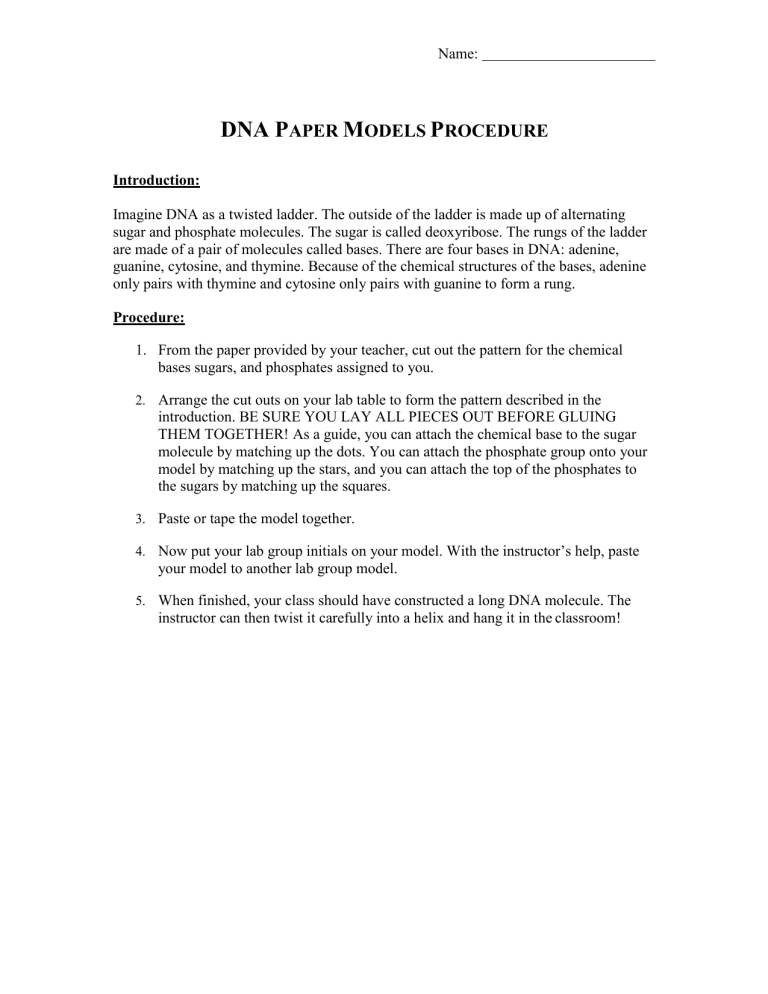
Name: DNA PAPER MODELS PROCEDURE Introduction: Imagine DNA as a twisted ladder. The outside of the ladder is made up of alternating sugar and phosphate molecules. The sugar is called deoxyribose. The rungs of the ladder are made of a pair of molecules called bases. There are four bases in DNA: adenine, guanine, cytosine, and thymine. Because of the chemical structures of the bases, adenine only pairs with thymine and cytosine only pairs with guanine to form a rung. Procedure: 1. From the paper provided by your teacher, cut out the pattern for the chemical bases sugars, and phosphates assigned to you. 2. Arrange the cut outs on your lab table to form the pattern described in the introduction. BE SURE YOU LAY ALL PIECES OUT BEFORE GLUING THEM TOGETHER! As a guide, you can attach the chemical base to the sugar molecule by matching up the dots. You can attach the phosphate group onto your model by matching up the stars, and you can attach the top of the phosphates to the sugars by matching up the squares. 3. Paste or tape the model together. 4. Now put your lab group initials on your model. With the instructor’s help, paste your model to another lab group model. 5. When finished, your class should have constructed a long DNA molecule. The instructor can then twist it carefully into a helix and hang it in the classroom! Name: DNA PAPER MODEL: HOMEWORK QUESTIONS Analysis Questions: 1. What base does adenine pair with? 2. What base does guanine pair with? 3. Describe the shape of the DNA molecule. Draw a picture if it helps! Connections: 1. What are the three components of a nucleotide? (HINT: What were the three components used in putting the model together? Remember that Adenine, Guanine, Cytosine, and Thymine are all Nitrogen Bases!) Look in your book if you are still unsure. 2. What is the name of the sugar molecule in the DNA helix? 3. Suppose you know that the sequence of bases on one DNA strand (one side of the DNA ladder) is AGCTCAG. What is the sequence of the bases on the opposite strand? 4. Assume that a 100-bair pair DNA double helix contains 45 cytosines. How many adenines are there? Conclusion: Write a summary of the structure of DNA that (at least) includes the terms: base, sugar, phosphate, nucleotide, (base) pair, and helix. (Please write this on another page and attach!) HALF-A-HELIX Complete the DNA helix by identifying which base pair should be found on the other half of the strand. Adenine Thymine Cytosine Cytosine Adenine Guanine Guanine Thymine LESSONS LEARNED: Check what you know after you are done □ Can I identify the components of a DNA molecule? □ Can I construct a model of the DNA double-helix using paper templates of those components? □ Can I identify the four bases in the DNA double-helix and explain which bases pair together? □ Could I predict what the second half of a DNA strand would look like if I was given one side of the double-helix as a template? □ Can I define the following terms? Adenine Cytosine Deoxyribose Sugar Double-Helix Guanine Thymine Phosphate Nitrogen Base Eukaryotic Prokaryotic
